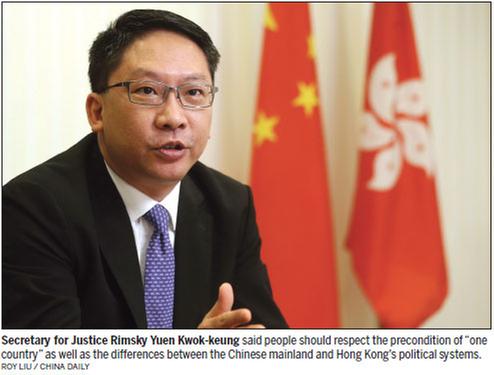'One country, two systems' vital to long-term stability

HK's Secretary for Justice Rimsky Yuen says 'one country' will always be the basis of 'two systems' and right balance had to be struck between them
Successful implementation of the Basic Law over the past 20 years shows that only by upholding the "one country, two systems" principle can Hong Kong maintain long-term prosperity and stability, Secretary for Justice Rimsky Yuen Kwok-keung said.
"Hong Kong's high degree of autonomy is authorized by the central government and lies in adherence to the 'one country, two systems' principle.

"We should respect the precondition of 'one country' as well as the differences of two political systems," Yuen advised.
Referring to some misinterpretations of this principle, he emphasized that "one country" is the foundation of "two systems". The difficulty is in attaining a sense of balance between them, he added.
Hong Kong people should take the country's development strategies into consideration and see things in a broader context, he said.
The secretary for justice believed Hong Kong's judicial independence had not been compromised by National People's Congress Standing Committee (NPCSC) interpretations of the Basic Law. This is because the power of interpretation by the NPCSC is authorized by the Basic Law.
"As a lawyer, I'd like to think it from the legal perspective. It is clearly and explicitly written in the Basic Law that its ultimate interpretation power rests with the NPCSC.
"The Basic Law, as a national law, respects our country's current legal system, which leaves the ultimate power for legal interpretation to the NPCSC," Yuen explained.
"Besides, academics and judges in Hong Kong believe it is necessary to have provisions connecting national laws and those of Hong Kong and (the Basic Law's) Article 158 plays such a role," Yuen said.
Article 158 stipulates that the NPCSC has the authority to interpret the Basic Law.
Yuen said the NPCSC interpretations did not have any negative effects on Hong Kong's judicial independence. The SAR's courts are able to hear relevant cases in a fair and just environment.
During the past 20 years, Hong Kong, as a common law jurisdiction, has attracted more than 20 world-renowned overseas judges to work for the Court of Final Appeal. This showed the international community's confidence in the city's judicial independence and rule of law.
"Foreign judges wouldn't come to Hong Kong and keep providing professional services for us should they not recognize our legal system and judicial independence," Yuen said.
He also mentioned that Hong Kong topped the list for foreign investment in Asia due to its well-respected legal environment.
The city's fine performance in upholding the rule of law has not only drawn global recognition and investment but helped investors from the mainland with their go-global strategies under the Belt and Road Initiative.
"Hong Kong can use its advantages in legal services to support mainland companies' foreign investment activities under the Belt and Road framework," Yuen said.
"Making investments in a foreign country entails many foreseeable legal risks from contract negotiation to fulfillment due to different laws and regulations enacted in different places," he added.
"Hong Kong is able to provide professional services in dealing with such issues with decades of experience in international trade and legal risk management."
Yuen hopes the mainland, as an emerging economic power, can play a more active role in international trade because the Belt and Road Initiative involves much national-level cooperation. This includes infrastructure, people-to-people exchanges and cross-border investment.
In the past, the mainland lacked experience in these areas because regulations were usually enacted by Western countries which used to play leading roles in globalization.
Hong Kong would love to offer its expertise if the nation ever needed it in future Belt and Road cooperation, Yuen said.
Hong Kong's legal advantages are the result of joint efforts by many. While this has been hard-earned, it clearly needs further effort, he ventured.
Yuen believes it is necessary to carry out legal reforms in such areas as fintech to accommodate internal and external developments.
"The global technology innovation sector grows so fast. If we cannot keep our laws updated, we will lose our advantage. We should let the development of legal systems catch up with that of all society.
"Therefore, we need to do more research to pinpoint our position in the blueprint of the national development plan. This includes the 13th Five-Year Plan (2016-20), Belt and Road Initiative and Guangdong-Hong Kong-Macao Greater Bay Area," he said.
zhanqianhui@chinadaily.com.cn
(HK Edition 06/29/2017 page4)
Today's Top News
- Takaichi officially reelected as Japan PM at Diet
- Xi sends Chinese New Year card in return to friends in US state of Iowa
- Japanese PM Takaichi's cabinet resigns
- Iran not to abandon peaceful nuclear technology
- 2nd round of Iran-US talks held in 'constructive' atmosphere, new talks to be scheduled: Iran's FM
- The Year of the Horse: A new gallop for the Spring Festival Gala






























